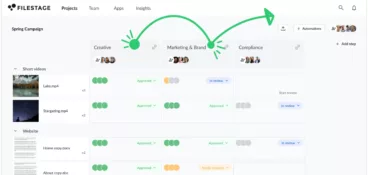Everyone in business knows how hard it is to keep up with multiple projects, especially when meeting deadlines is the ultimate goal. Every client wants a promptly completed project, despite the workload you may be accumulating or the number of your employees.
This will mean keeping motivation high and striving to accomplish all tasks in line with your project deadlines. Luckily, there are a few proven tips to help.
Why meeting deadlines is important
We might think that we would be thriving in a work environment without project deadlines hanging over our heads. But this kind of environment could become a problem for both the staff and the company in the long run.
Setting and meeting deadlines in the workplace is essential as it helps with time management and helps employees remain accountable for every task assigned to them. At the same time, deadlines reassure clients that the work will be done in time.
Here are the main benefits of meeting deadlines:
- It proves your credibility and stature across the business
- It encourages loyalty and respect among your stakeholders because work is always delivered on time
- It improves the productivity of your team so you can get more done in less time
How to meet deadlines at work
Here are 12 proven strategies on how to meet deadlines and save time:
- Create a timeline for the creative department
- Define a deadline for production
- Identify task dependencies
- Break down work into smaller tasks
- Prioritize tasks
- Add a buffer
- Define focus time
- Keep track of projects and deadlines
- Communicate with your co-workers
- Make sure everyone is on the same page
- Don’t overcommit
- Learn from previous mistakes
1. Create a timeline for the creative department
When looking to start a new larger project or create an advertisement, the first thing to know is that deadlines matter. Assign deadlines for the creative department. This means all the advertising pitches must be prepared on a detailed schedule.
This will help you toss less appealing ideas and focus on developing the more attractive ones. It also bars excessively poor ideas and helps with time management.
One of the challenges that may block this phase is a thing called the creative block. This refers to the inability to think up creative ideas due to time pressure. When this happens, there are some ways to get past it and kick-start your team’s creativity again.
It can include:
- listening to music and eliminating distractions
- taking a walk
- brainstorming with your team
- watching funny videos
- calling it a day and looking at the problem with fresh eyes tomorrow
2. Define a deadline for production
During production, project managers divide the project into smaller tasks and assign them to the right people.
The project managers will also set deadlines for completing the assigned tasks. This will involve multiple milestones like casting, filming, or sending assets to print and creating graphics.
The challenge that you’ll likely face at this stage is coordinating all the smaller tasks and identifying dependencies. You can do that by encouraging communication between each department, like asking project managers to share their difficulties and request assistance when needed.
When every department communicates effectively, production time can be cut in half.
3. Identify task dependencies
Identifying task dependencies will help with meeting your project deadlines. This means clearly defining the order in which the task needs to start or be finished.
When task dependencies are identified, work can progress as planned without hiccups. Moreover, your team can prioritize the crucial tasks over the less urgent ones.
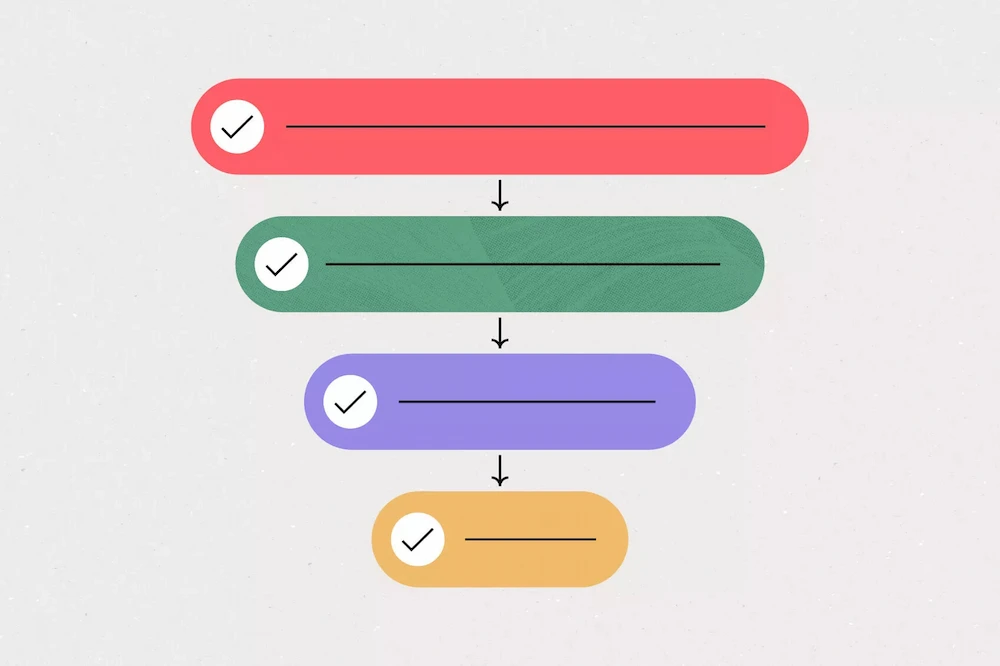
For example, meeting a deadline in video production means taking care of a number of smaller tasks. More specifically, you need to decide on the creative direction and create a storyboard before you can shoot the video.
Learn more about different types of dependencies.
4. Break down work into smaller tasks
One way to meet deadlines with less stress is by breaking down projects into micro-goals and proceeding from there. This means that you are one step closer to completing projects with every task your team completes.
You can break down larger projects into smaller tasks by identifying every milestone and what it requires. For example, an advertising company with a new project to market soft drinks starts this process by generating creative ideas.
Once an idea is approved, the next milestone will be the production of all deliverables. Production could entail casting, filming, and graphic editing, among other tasks.
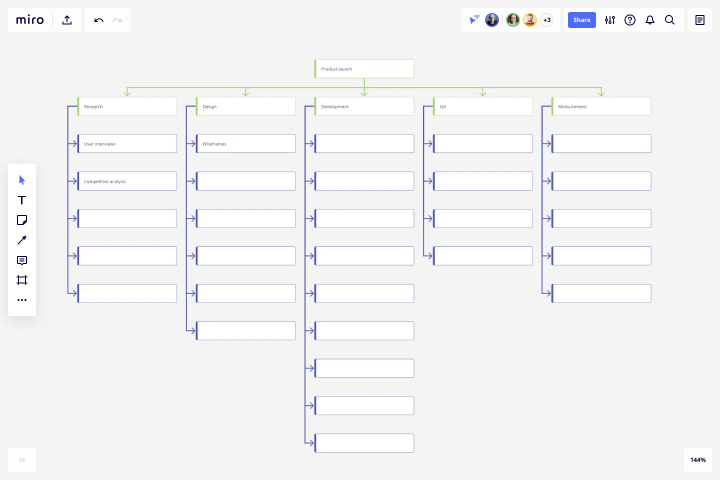
When you split a project into milestones and tasks, the project no longer seems like a big mountain that is impossible to climb. This creates a positive psychological effect for the whole team as everyone will have a feeling of accomplishment with each completed milestone or task.
It also motivates team members to approach and complete the next milestone with greater energy.
5. Prioritize tasks
When completing a project, you must know how to prioritize your work and meet deadlines even when unexpected problems arise.
Prioritization is an important part of project management where you determine which tasks’ should be handled first based on their level of importance. You could be working on multiple projects at the same time, but when a deadline approaches for a particular one, that project takes priority.
Plus, there may be a situation when you are putting the finishing touches on a project and a great new idea pops up that could improve the project.
While it could be tempting to delay the project to make the changes, not meeting deadlines at work shouldn’t be an option. It’s always better to meet the deadline instead, and suggest your creative addition to the client.
6. Add a buffer
If you work for a company that handles multiple projects, adding a buffer to your deadlines won’t hurt.
You know how you set your watch thirty minutes earlier just so you don’t miss a flight? It’s about the same, but in this case, you’re setting your internal project deadlines two or three days earlier than the date you’ve agreed on with the client.
This way, you can gather feedback from colleagues and complete projects in time without feeling overwhelmed.
7. Define focus time
When working on projects with a tight deadline, define your daily focus time. There are a lot of things that could cause a distraction from your work. Things like multiple incoming Slack messages, meeting invitations, and private phone calls can keep you away from your tasks.
The goal is to have some dedicated time that allows you to work on projects without getting interrupted. You will be truly surprised by the amount of work you are able to get done in just a few hours without distractions.
8. Keep track of projects and deadlines
When you’re working on multiple projects and you’re in a race to meet all your deadlines, any one of your projects can easily fall through the cracks. So, besides having the ability to stay focused, you need a planning tool that helps you keep track of your projects and tasks.
Such a planner should include all project milestones and tasks as well as a detailed timeline of all your projects. This will keep you sane amidst the chaos and ensure you can finish all your tasks on time.
Checking your planner first thing in the morning will help you shape your day and prepare your mind for the tasks ahead.
Note: Adding a task to your calendar by typing it or writing it down will also make you less likely to forget about it.
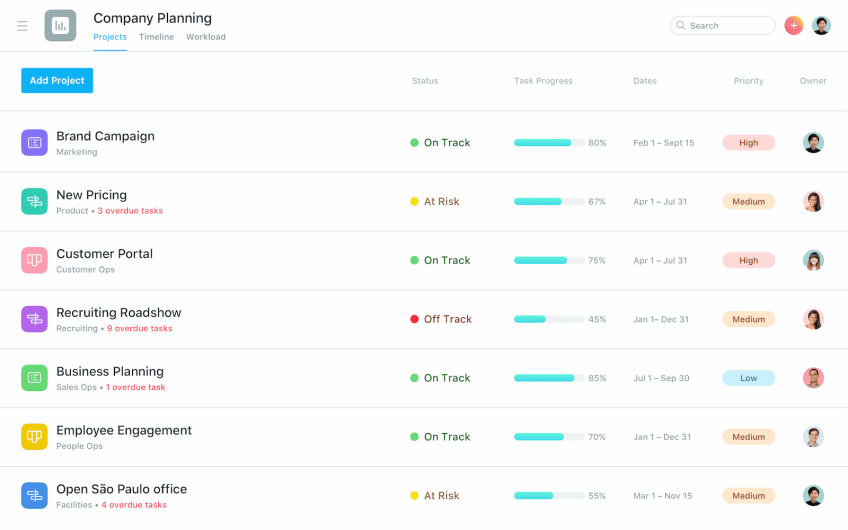
9. Communicate with your co-workers
Every organization thrives on effective communication. Where communication is poor, multiple projects could get muddled up or delayed. That’s why it’s essential to work closely with co-workers and establish good communication.
Good communication will help each department to understand and be committed to a clear deadline for every aspect of a project. And for a project to succeed, the communication plan should be as simple as possible.
This means that you can have meetings where you discuss progress and challenges, share updates in work channels like Slack, or share feedback and notes in Filestage. The key is to keep the communication process transparent so everyone knows the status of the project.
With Filestage’s online proofing software, you can easily share files with colleagues to get their feedback on or approval of your work.
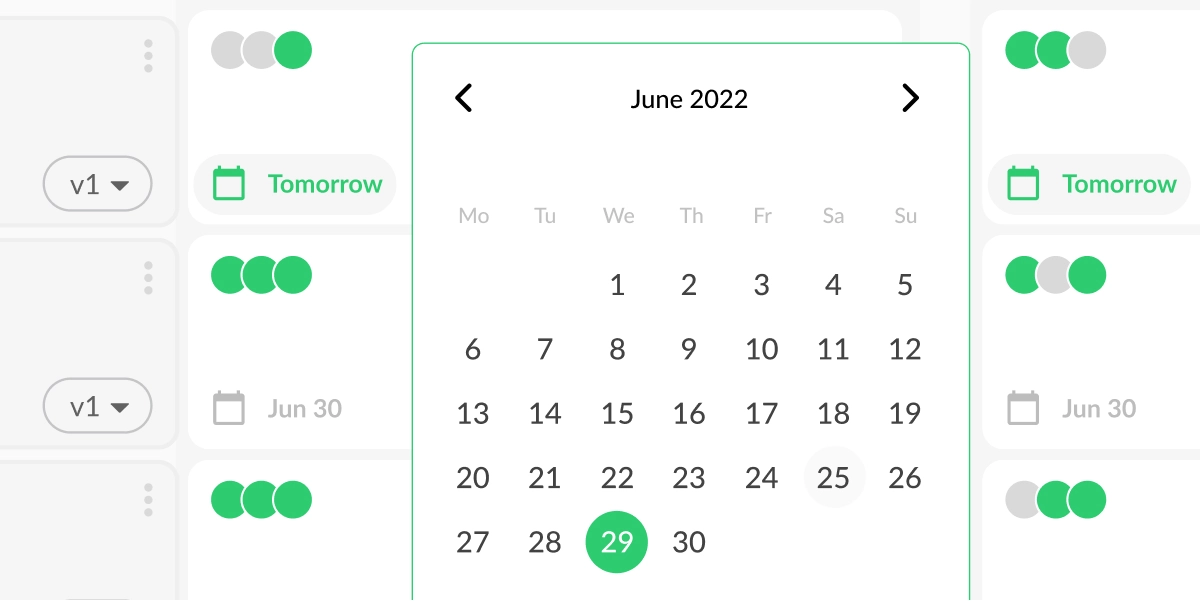
10. Ensure everyone is on the same page
If there was some miscommunication with the client early in the project planning stages, it’s likely your team will be held responsible for the mistake. This means not only taking the blame, but also results in a bad relationship with the client and a waste of time, money, and other resources.
That’s why it’s important that everyone, including the client and your colleagues, are on the same page about the goals, targets, and project deadlines.
And the best way to do that is by hosting regular meetings at the beginning of the project with everyone involved to clearly communicate the stated outcomes of the project.
11. Don’t overcommit
No matter how dedicated you are to productivity, be sure not to undertake more tasks than you can complete at any one time.
The results of dealing with multiple projects on tight deadlines often include confusion and fatigue, which can cause you to miss important deadlines. Additionally, by overcommitting, you can end up doing more damage than good and waste your company’s time and money.
So, consider getting a daily planner where you’ll add all projects you’re handling, mark off the completed tasks, and take your time for the ones left on your list.
12. Learn from previous mistakes
Although missing a deadline is something we want to avoid at all costs, it is bound to happen from time to time. When it happens to you, try taking it as a learning experience rather than beating yourself up about it. Think of where you went wrong and avoid making the same mistake in the future.
How do you handle meeting tight deadlines?
We’ve all had those days when we arrived at work thinking we only have a few prepared tasks to handle that day, and ended up having a crazy long day trying to meet some unexpected deadlines.
When handling these situations it’s important to first of all stay calm and focused. Afterwards, you can dive deeper into the issue.
Here are some steps you can take to handle meeting tight deadlines:
- See which parts you have and what’s missing for the deadline
- Focus on what you can do and delegate other parts to your team members
- Clearly and transparently communicate with everyone who needs to be involved
- Have everyone share all parts of the project in a centralized platform so you can track progress
- Come together with your team to piece it all together and meet the deadline
Use Filestage to ensure you meet tight deadlines
With Filestage you can share all your work, including designs, documents, and videos, in one central place and get feedback faster. By setting clear due dates for each file, reviewers understand exactly when they need to review or approve a specific file.
Having such clear deadlines for files helps reviewers better schedule their own work. Plus, you can speed up review rounds and keep projects moving forward.
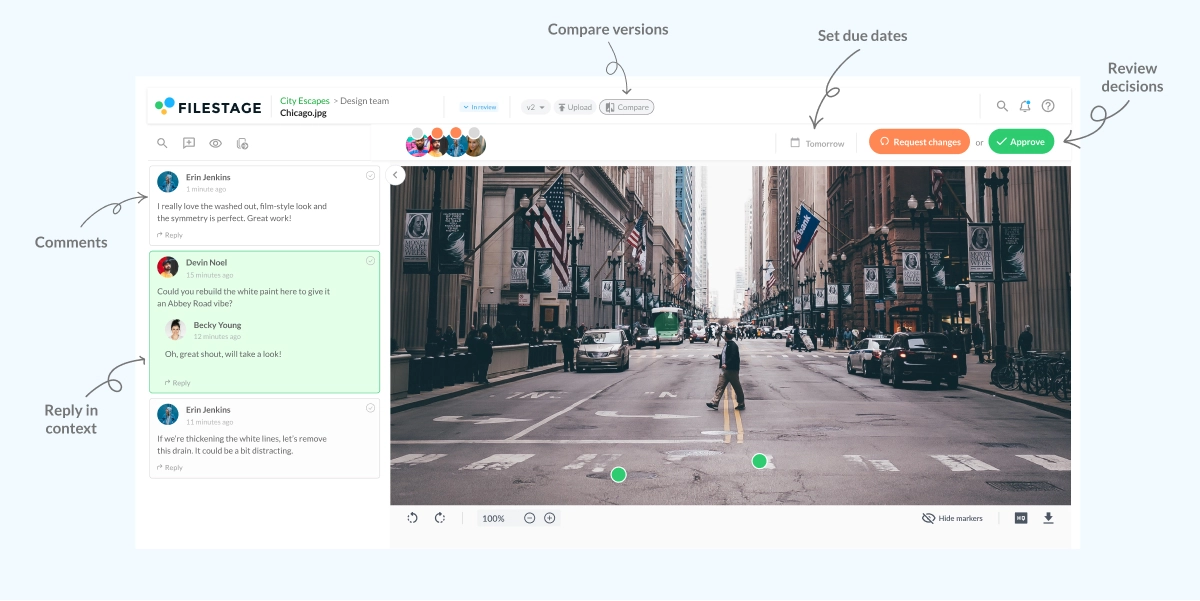
The central dashboard of Filestage also enables you to maintain a clear overview of each file’s status and progress. This way you can organize your resources effectively as you receive feedback. When you share, review, and approve all your files in Filestage, you’ll meet every deadline.
Final thoughts
Deadlines are essential for creating a structure and ensuring each team member is accountable for the work they do. They are also necessary because only with deadlines can you make sure to adequately prioritize work, and that everyone stays productive.
See what makes Filestage your go-to tool for meeting deadlines and start a free trial →




